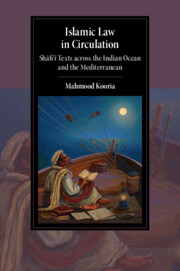Book contents
- Islamic Law in Circulation
- Cambridge Studies in Islamic Civilization
- Islamic Law in Circulation
- Copyright page
- Dedication
- Contents
- Figures
- Acknowledgements
- Notes on Transliteration, Dates and Places
- Chapter
- Introduction
- Chapter
- 4 The Code
- Chapter
- 5 The Commentary
- Chapter
- 6 The Autocommentary
- Chapter
- 7 The Supercommentaries
- Chapter
- 8 The Translations
- Conclusion
- Bibliography
- Index
- Other Titles in the Series:
5 - The Commentary
from Part II
Published online by Cambridge University Press: 24 March 2022
- Islamic Law in Circulation
- Cambridge Studies in Islamic Civilization
- Islamic Law in Circulation
- Copyright page
- Dedication
- Contents
- Figures
- Acknowledgements
- Notes on Transliteration, Dates and Places
- Chapter
- Introduction
- Chapter
- 4 The Code
- Chapter
- 5 The Commentary
- Chapter
- 6 The Autocommentary
- Chapter
- 7 The Supercommentaries
- Chapter
- 8 The Translations
- Conclusion
- Bibliography
- Index
- Other Titles in the Series:
Summary
The authoritative texts of the Shāfiʿī school such as the Minhāj began to be circulated, interpreted and advanced across the Indian Ocean rim, where its largest followers had started to take up residence. This transoceanic transmission was mediated by other texts in the interim, mainly by the commentaries of the Minhāj. This chapter analyses the commentarial intermediation between the Mediterranean and Indian Ocean in the sixteenth century with a focus on one commentary, Tuḥfat al-muḥtāj (Tuḥfa) by Ibn al-Ḥajar al-Haytamī, an Egyptian jurist who built up a successful career in Mecca. The trajectories of this commentary reflect many of the contemporary developments in political and cultural realms, such as the decline of the Mamlūks, the rise of the Ottomans and their conquest of the Middle East, and the increased mobility toward Mecca and beyond to the Hijaz. The Tuḥfa addressed its immediate regional contexts, while reasserting the geo-cultural superiority of Mecca and the Hijaz and the racial prominence of the Arabs. Its approach was challenged by Ibn Ḥajar’s colleagues from Cairo through their commentaries. Just as Nawawī once amalgamated two ṭarīqas, now commentators on his Minhāj were divided into two sub-schools.
Keywords
Information
- Type
- Chapter
- Information
- Islamic Law in CirculationShafi'i Texts across the Indian Ocean and the Mediterranean, pp. 175 - 224Publisher: Cambridge University PressPrint publication year: 2022
